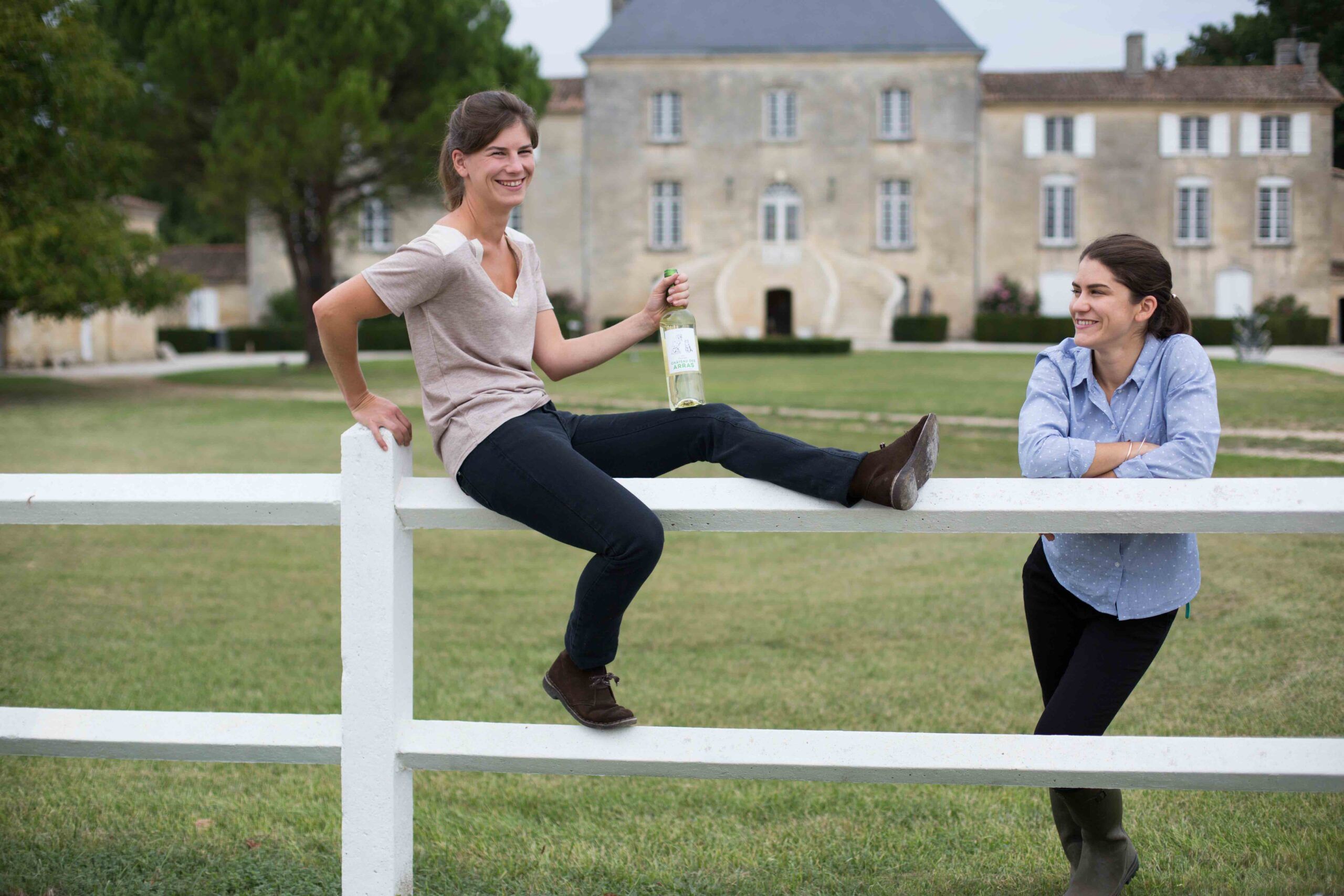Having spent time away from Château des Arras, sisters Anne-Cécile and Marie-Caroline Rozier are now re-united at the family estate and working together to put their stamp on the Bordeaux wine scene.
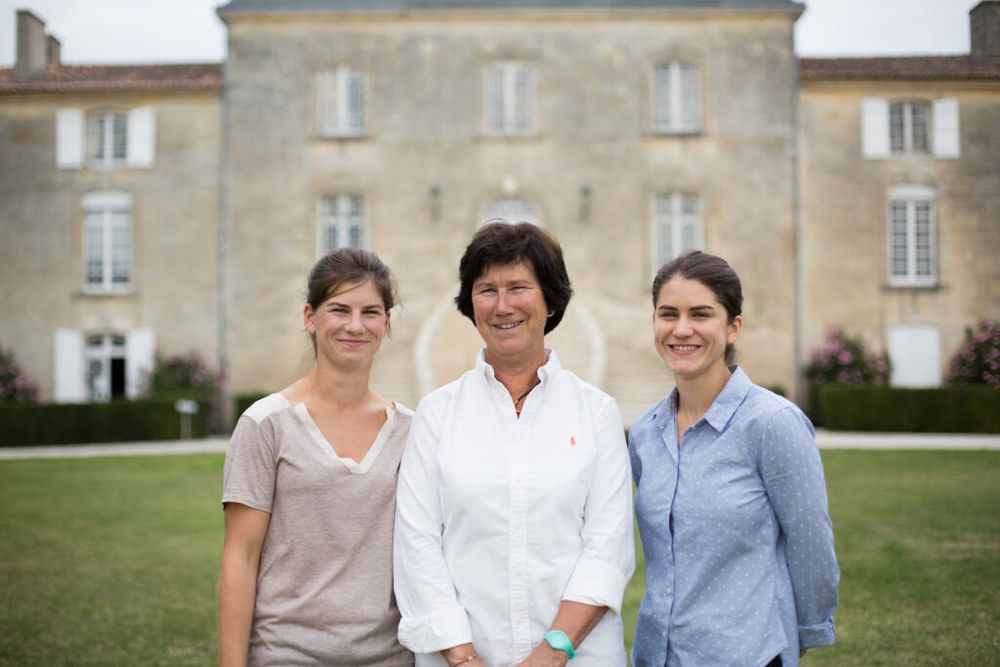
Family affair: Anne-Cécile and Marie-Caroline with their mother Claudine Rozier at the family property
Tell us about yourself and your background?
Anne-Cécile: I feel like I fell into a barrel of wine when I was a kid. I went on to study winemaking, and now have a master’s degree in Terroir and Vines. I have been able to work different vintages at other estates, both here in France in the Médoc and Bandol and then down in Hawkes Bay in New Zealand. I came back to Château des Arras for the 2013 harvest. Not that was not the easiest one to start as it was quite a difficult year for Bordeaux.
Marie-Caroline: We grew up on the estate, along with our brother, and have always been surrounded by the vineyards here. It is a beautiful and a rather large playground. I started my career studying business in Montpellier and the UK, before moving to New Zealand. There I worked for an export broker for four years and was then recruited by a wine merchant. Two years working in wine made me realise how much of a challenge it must be for my sister looking after the wine operations at Château des Arras, so decided to come home and see if we could combine our skills to run the business together. That was in 2014 and I officially started back here in 2015.
When our father died and our mother took over the estate she wanted to continue his work and passion. Now our mother looks after the bed and breakfast side of the business and my sister and I run the wine operations.
Anne-Cecile – why did you want to be a winemaker?
It really was a passion for me. I have always wanted to become a winemaker. I really enjoyed following the harvest in different parts of France and then overseas, but I knew I would be in my happy place at Château des Arras.
When you grow up surrounded by vines, you learn without even noticing. You know the life cycle of the plant, what happens during the different seasons. Studies help to gain a better understanding and to specialise. I didn’t do a formal winemaking course, but preferred to study the plant and the soil for my Master’s degree. Because 80% of the work is actually happening in the vineyard and not the cellar. Without good fruit you don’t make a good wine.
I think all the work experience I was able to have in different wine regions really helped me enlarge my winemaking vision. It made me more open minded to different points of view and helped define what would be the best for our vineyards and wines.
Can you describe the style of wines you are making?
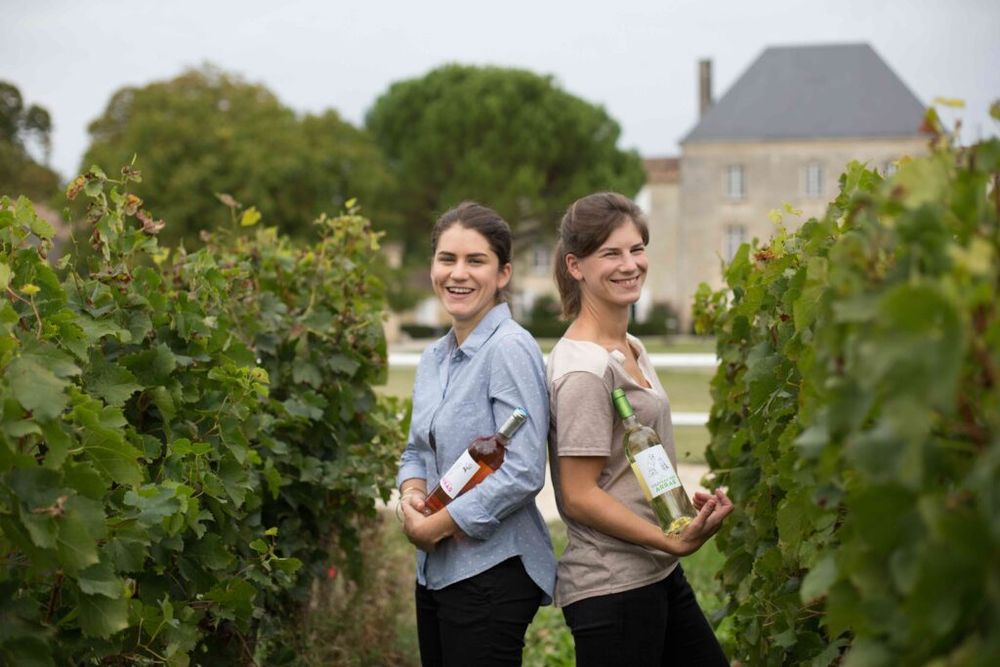
The two sisters both returned to the property around seven years ago to help take over the winemaking duties from their mother
Anne-Cécile: My role is to make sure we are doing the right things at the right time so the vines can produce the best grapes. As we grow organically, it is also important for us to take care of the biodiversity in the vineyard. In total we have 30 hectares, which is good size vineyard to work with. It requires a lot of work for four people – including myself and Marie-Caroline.
We have increased our range of reds so we can offer wines for various occasions and tastes. We don’t add any sulphites to our wine and are looking to make bright, fresh, very fruity wines. As though you have bitten into a handful of fresh berries. We also do a number of different blends, with a bit of oak, with our rich Merlot or Cabernet Sauvignon.
Marie-Caroline: When I came back in 2015, we worked together to create new wines and redefine one cuvée in particular. We also added a white to the range so we could offer the three colours: red, white and rosé.
What do you find the most rewarding about your role?
Anne-Cécile: The most rewarding moment, and also the most stressful, is when we bottle a wine. It can take up to three years to actually bottle a wine, from the moment you first prune a vine, to the time I bottle the final result of my work.
Marie-Caroline: My most rewarding moment is when I am with a buyer tasting our wines and they give us great feedback about them. I always say I will pass on the compliment to my sister.
What do you find the most challenging?
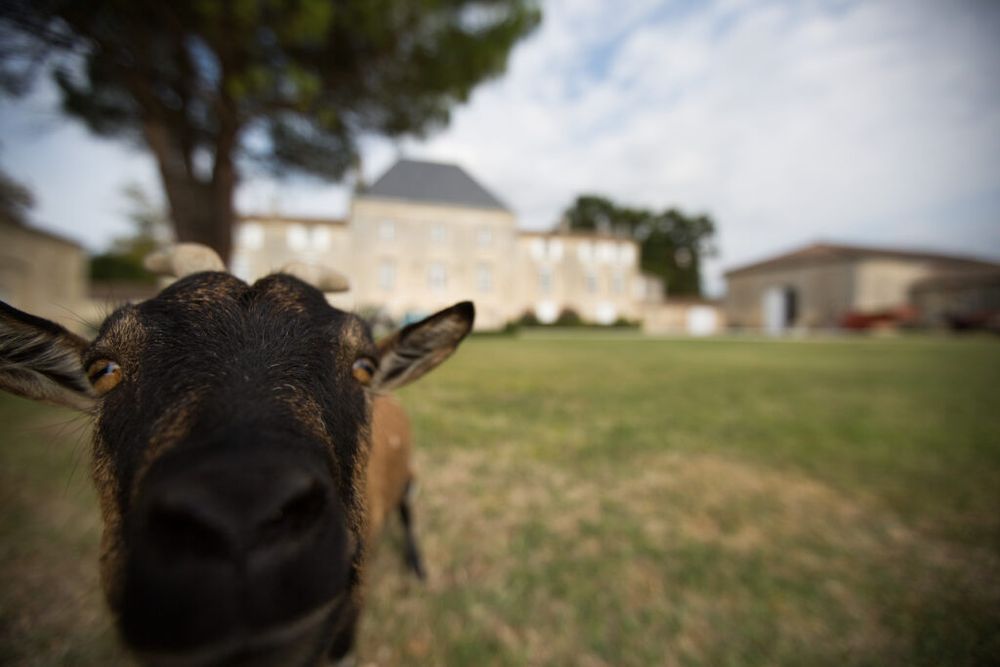
Nature and farm animals are very much a way of life at Château des Arras.
Anne-Cécile: Working with nature. For better or worse, you never know what to expect. It keeps you on your toes. Also being two women, with little kids can be tricky. We had to rework our timetable and our priorities.
How have you found it being a woman working in the role you have as a winemaker?
Anne-Cécile: Mostly it is not about being a woman, but about being young. Or maybe both. But it was hard to get respect for what I achieved. I guess I had to prove that I could do it, more than I thought it was necessary.
Marie-Caroline: Maybe I am lucky or I don’t pay attention to these kind of things. But in New Zealand I never had an issue with men. Also, they respected my judgement because I grew up in a vineyard. As for today, I guess my main concern is what to wear. If I dress up too much, I am worried about not being taken seriously and if I don’t make an effort then I am worried people will look down on me. But I am becoming more confident with the years and I care less.
What advice and support would you give to other women looking to work in wine, and winemaking and viticulture?
Anne-Cécile: Trust yourself. We have a different way of doing things, of tasting wine. We are as good as anyone. Also don’t think about what a man or woman should do, just do as you would normally do.
What steps you would you like to see the industry in general doing to be more inclusive?
Anne-Cécile: When we speak out, it is not because we are angry. It is because we have something to say. This is often misunderstood when women take a strong position.There is not enough women in the industry. And I don’t think it is because they have a lack of knowledge or skills.
I would like to see more younger people and younger women working in the industry. It is more about letting new faces get into this small industry. We need to see some changes. We need a fresh start. New ideas, new perspectives. Let’s stop putting people inside a bottle because they come from a specific wine region or have a different background. We have so much more to offer. Sometimes, it feels like buyers are buying for themselves and not for final consumers.
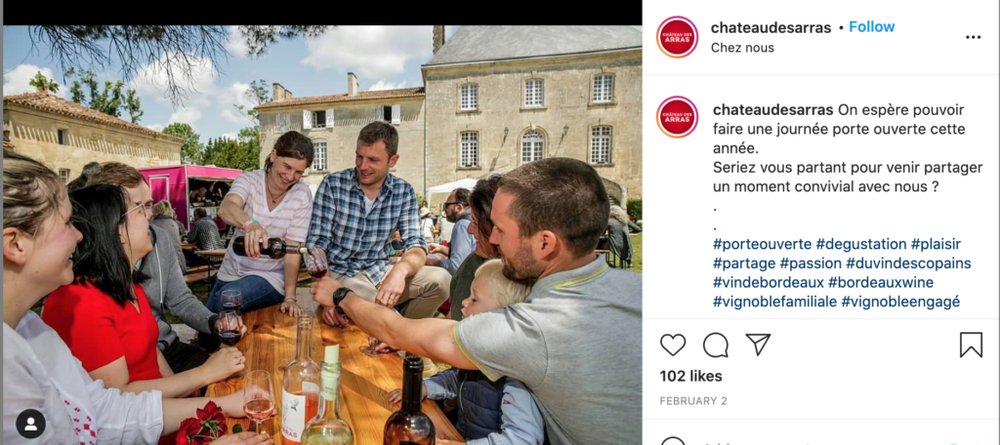
Family is at the heart of Château des Arras
Marie-Caroline: Sometimes I feel like I am talking with people that are disconnected with the final consumers. And I feel justified in saying that as I spend a lot of time with them during the peak tourist season.
Even if our property is located in Bordeaux and we’re producing Bordeaux wines, it doesn’t mean that we are making unaffordable wines. Actually, when we make our wines, we mostly think about who is going to drink it. Firstly, our friends and family. And trust us, they are looking for easy to drink wines.
Do you see those steps being taken and if so what in particular do you think is having the most impact?
Anne-Cécile: It feels at time like we are seeing more women in the trade, but as we tend to gather and share our experiences,it can feel like we are surrounded by women. But it is not the reality. Things are changing, particularly over the phone, people seem less surprised when they ask for the boss and we say we are the boss.
But still, suppliers who come for the first time at the property to sell some mechanical products, walk towards the men, not towards the women. And our employees love to respond that the boss is just behind them.
Do you see yourself in a leadership role as a woman in the trade – if so what steps and influence do you hope to have?
Marie-Caroline: I am not sure, only to say what we post on social media or what you see when you come to visit, is 100% us. We believe that people need to see the reality of our work. Yes, we sometimes prune with red nails. Is it a problem? Yes, Anne-Cécile drives a tractor and wears pink boots. So what? We don’t think gender should be related to a specific job. It is important to stay true to yourself.
What have been the latest steps and innovations you have introduced to your wines and vineyard to improve its quality?
Anne-Cécile: We installed a tool to regulate the temperature of our stainless tank. It made our life so much easier, less stressful. We can now control the temperature during fermentation and stop wasting water. Before that, we used to run water over our tank to cool them. And we couldn’t reuse this water. It was painful, even though the water came from our own well.
What plans do you have for the future?
Marie-Caroline: We are quite happy with what we are already doing. But having more time to spend with people visiting us would be great. We created four different tours, trying to offer something different to please the whole family. Wine tasting is very nice, but it becomes very tricky when you have your kids with you. So, every year we try to improve. Our role is to teach what we know and make sure we pass on the message in an easy and friendly way.
- UK distributor is Prime Wines Limited. Contact John Togood at primewines@aol.com.
